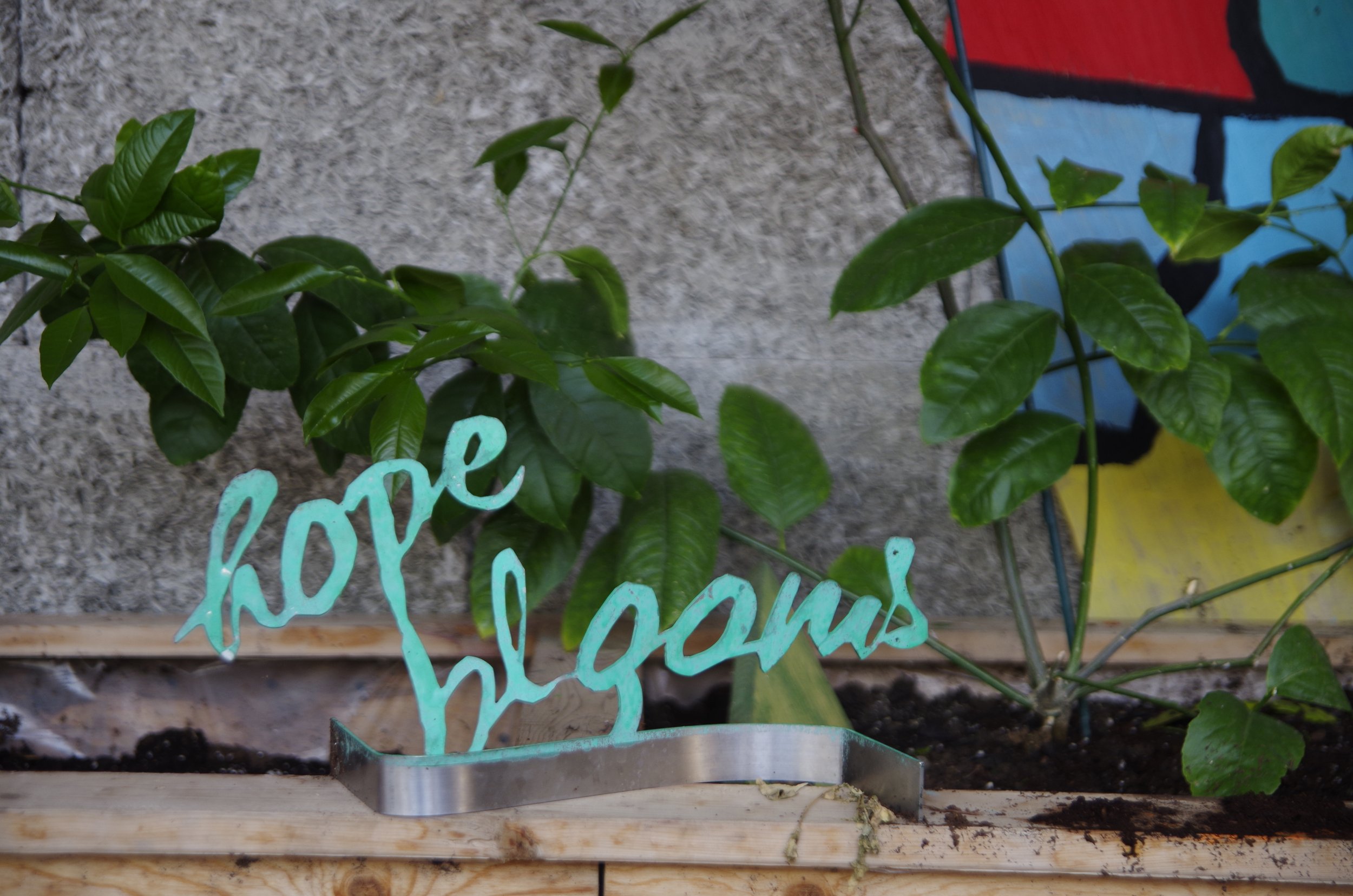Hope Blooms and the moveable feast
Halifax’s Hope Blooms ushers in a new generation of climate stewards.
By Pam Sullivan, Climate Story Network
Kolade Boboye, Manager of Social Business and Innovation - Hope Blooms. Photo by Sean Kelly.
If the forward-thinking work of Halifax’s Hope Blooms is a tale for our times, then program alumni and current staffer, Kolade Boboye, is one of the story’s more inspiring characters.
Sitting across from him at one of the organization’s most recent purchases — two solar-powered, public charging/wifi stations — the 23-year-old’s energy and enthusiasm for the group’s many programs and projects is obvious.
Hope Blooms’ Manager of Social Business and Innovation, Boboye, who emigrated from Nigeria at the age of seven and registered with the program the following year, walks through the 15-year history of Hope Blooms: from its earliest days making and selling salsa, through its appearance on CBC’s Dragon’s Den, to where it finds itself today.
A familiar organization to most Haligonians, its story began with a single plot of land in the Uniacke Square area of the city’s North End and one person’s drive to provide healthy food for the community.
“Jessie (Jollymore), a community dietician, saw that the city had the land, and just had this vision to use this land to grow food for youth to take home,” says Boboye.
Since 2015, Hope Blooms, also known as Hope Blooms Campus, has grown to include not only the original working garden where local kids still work every summer (and producing the salad dressing they’ve become famous for), but a fair food community farmers’ market with its own digital currency that sells subsidized, locally grown produce, afterschool leadership programs, a mentorship and tutoring program, Green Labs — where kids get hands-on experience with issues around climate change, and youth-led social enterprise initiatives.
With 126 kids currently registered for programming, and 16 alumni — all currently in university (as far away as California’s Stanford university and NYU) and recipients of Hope Blooms scholarships — the model is flourishing and, says Boboye, only expected to keep growing as demand increases.
Most recently, the organization, which has just received funding from HCi3 (Halifax Climate Investment, Innovation and Impact) for a second time, is embarking upon the installation of a solar tracker for their operation, which Boboye tells me will take them completely off-grid while also providing a social entrepreneurial experience for the group. Tracker solar panels follow the sun’s movement throughout the day, maximizing the clean power Hope Blooms can harvest.
“We’re talking to a few different companies right now, one of which has translucent solar panels, so we can still grow food underneath it,” Boboye says.
“And the social enterprise aspect allows us to calculate usage, for example water and light usage, so the kids can now say, okay, if we change how we cook, how does our consumption go down.”
Given the current climate scenario, says Boboye, a “disruptive” approach to meeting the crisis head on is what’s called for.
“We’re in an era where I think everyone would agree that the old processes clearly don’t work,” he says. “And it’s also important to start with kids, because with them there’s less friction; they’re more curious and willing to learn.”
And as goes the expression, “if you want something done, ask a busy person,” so it goes with Hope Blooms. Outside inquiries around creating a transferable model to be applied elsewhere — around both the municipality and the province — has the group starting to turn its eye to an expanded model, though, says Boboye, in a somewhat hands-off manner.
“Everything here is catered to this community, and its specific needs, but if we were to expand, bringing our model to other areas of the province, it would be more of a playbook; a flexible model a community could shape to their own unique needs,” he says.
It’s hard to calculate just how much positive impact Hope Blooms, with its inclusive and progressive programs, has meant to the Gottingen Street community for the last 15 years. But the ability to invest in the lives of historically underrepresented youth, and engage them as valuable citizens, in touch with not only nature, but their community’s wellbeing and the future of the planet, appears to be a recipe for success and a transferrable model for any community looking to make a difference. And if you ask Kolade Boboye, he’s confident we’re in good hands.
“If you can install these traits and skills in the younger generation then I wouldn’t be too worried about the future. We’re trying to champion everyone to be a hero, and heroes save the day.”
-30-
The Climate Story Network is an initiative of Climate Focus, a non-profit organization dedicated to covering stories about community climate solutions.
By downloading this article and/or images, you agree with our Terms of Service.
Download the article >
See the photos available for this story >
Added to the Climate Story Network website: October 17, 2023
You can subscribe to get notified by email when a new article has been published to our site.


